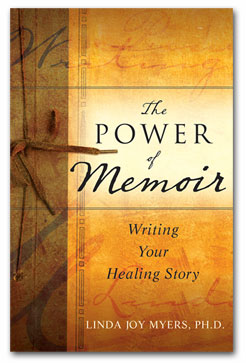Linda Joy Myers, Ph.D., author of The Power of Memoir, launches her blog tour!
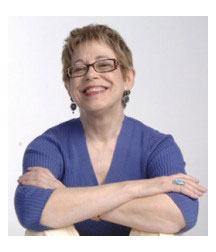 & Book Giveaway Comments Contest! & Book Giveaway Comments Contest!
Linda Joy Myers, Ph.D. is the president of the National Association of Memoir Writers and the author of the prize-winning memoir Don't Call Me Mother: Breaking the Chain of Mother Daughter Abandonment. Her new book The Power of Memoir: How to Write Your Healing Story was released in January 2010 through Jossey Bass publishers.
Linda has been a therapist in Berkeley for the last thirty years, and received her MFA at Mills College.
Through her workshops, online coaching, and speaking engagements, Linda integrates the principles of healing and creativity in presenting the powerful healing process of writing true stories. Her first book, Becoming Whole: Writing Your Healing Story, was used as a text by therapists, ministers, and writing coaches, and was a finalist in ForeWord magazine's 2008 Book of the Year Award. Linda's prize-winning nonfiction and poetry has been published in various literary journals. Her novel excerpt, Secret Music, a novel about the Kindertransport, music, and redemption was a finalist in the San Francisco Writing Conference contest.
Linda is past-president of The California Writers Club, Marin branch, and former vice-president of the Women's National Book Association, and has served on the board of Story Circle Network.
Find out more about Linda by visiting her websites:
Website: www.thepowerofmemoir.com
Blog: www.lindajoymyersphd.com
The Power of Memoir: Writing Your Healing Story
By Linda Joy Myers, Ph.D.
The Power of Memoir is a groundbreaking book that presents an innovative step-by-step program using memoir writing on the journey of emotional and physical healing. By drawing on the eight steps outlined in The Power of Memoir, you'll learn how to choose the significant milestones in your life and weave together your personal story. You'll discover how writing your truths and shaping your narrative propel you toward a life-changing transformation. The Power of Memoir offers the tools you need to heal the pain of the past and create a better present and a brighter future.
Writing Reference
Paperback: 272 pages
Publisher: Jossey-Bass (January 2010)
ISBN: 0470508361
Book Giveaway Comments Contest!
If you received our Events Newsletter, remember, we are holding a contest to win a copy of Linda Joy Myers's book The Power of Memoir to those that comment. So, grab a cup of coffee, pull up a chair, and enjoy the chat, and share your thoughts, and comments, at the end. We will randomly choose a winner from those who comment.
Interview by Jodi Webb
WOW: What led to your work doing memoir writing workshops and eventually The Power of Memoir?
LINDA: I came upon memoir writing from the desperate urge over many years to write about my childhood, to try to express the confusion that was going on inside me. I also wanted to write about those I loved and those who saved me, so it was a way to honor and thank them and to appreciate them. So yes, my work to teach about memoir writing came first through writing to heal—though that was not the phrase used at the time, nor had any research yet been done on that subject.
The impetus to write my first book on healing, and then ultimately The Power of Memoir came from the amazing research first published in 1999 in the Journal of the American Medical Association by Dr. James Pennebaker and others that writing helped to heal physical ailments such as arthritis and asthma. Though I sensed that writing was helpful, and I and many of my friends had been journaling for years, to discover that in fact writing was healing was very exciting. I’d always wanted to find a way to integrate therapy with writing. I read all of Dr. Pennebaker’s articles and talked to him in person as I was working on my first book.
For a few years, I trained therapists in using writing to work with clients, and in those workshops, I discovered how quickly “non-writers” produced interesting and meaningful stories. It became clear that anyone could find the stories within if they were given the time and encouragement. I became quite passionate about spreading the word about writing. I saw that anyone could learn to do it if they wished, and that it was a powerful tool for change and transformation.
LINDA: I completely backed into writing a memoir. The thought of writing a book was so terrifying, I’d stop writing when I thought of it! For so long I struggled with the form all the stories I had might take. I had stories from the 19th century from my great-grandmother, I knew my grandmother’s stories and some of my mother’s story. I was interested in telling their stories, until one day a teacher told me that I should be writing my story. I nearly fainted. What—expose myself like that? I’d been taught that children should be seen and not heard, and not to air the family laundry—or else!
So it was a long struggle to find myself and give myself permission to write my own story. Also I didn't really know how to write! I began with painting my story, then moved into poetry, then into prose. I realized that the deeper story was falling through the cracks of the other art forms, and that prose would tighten the weave. Writing leads to more writing, and the more we write, the more we learn. Luckily I have always been an avid reader, with stacks of books all around me and reading more than one at a time, so I knew what good writing was like. But each of us has our own voice, and we need to find that.
The way I finally wrote my book was to write each individual vignette and not worry about a book or any order, and after a while I realized I might be writing a book, but still it took a long time for me to own that desire. My inner critic, remember? But when I turned my back on the project, I discovered that it chased me, wouldn’t leave me alone, haunted me. Finally I faced the demands the book was making on me, and got brave enough to finish it.
WOW: I've written many personal essays, snapshots of my life, but never really considered a memoir simply because my life feels...well, boring and predictable. Is every life memoir worthy?
LINDA: A lot of people ask that question, but often it’s in the form of: “Gee, I don’t really have a story worth telling.” Then they launch into the adventures they’ve had, the life challenges they’ve overcome—births, deaths, natural disasters. Spiritual learning, love, the joy of children, pets, and gardens. The thing is—everyone’s life is interesting if we look through the lens of the turning point moments, the moments of transition and transformation. People read memoirs to find out about how other people lived; we are all looking for guidance from others on life’s journey–how did they solve life’s problems, and how are they doing now? Can we overcome some of the challenges we face, and how? A memoir is a grass-roots sharing of life as we have lived it.
WOW: How do we decide what facet of our life experience to focus on in a memoir?
LINDA: Start with listing the 5-10 significant turning points in your life, and write about them. See where that takes you. Most of us will learn something from doing that exercise, getting more insights about our lives, and surprising us perhaps about how interesting our lives have been after all.
WOW: Although we think of memoir as being our life stories, the fact is other people get dragged in to the tale. How do we balance the need to tell our story with the needs of our memoir's co-stars to NOT tell their story?
LINDA: Most memoirists struggle with the issue of revealing secrets when they are searching how to tell their own powerful, and often shameful, truths. Secrets maintain a great power over us, and we are diminished by them. We become co-conspirators in a way to the family dynamics that we actually don’t agree with and want to break away from. So we get caught in a conflict—to speak or not to speak. To remain closed and complicit, or open up and take the risk of losing friends and family, of being ousted from the family, or shamed once again into submission.
I tell all my students to be open to writing two versions of the story: first, write for yourself, to clear out your emotional closet, to sort the events that are jumbled up in your mind. Research has shown that this kind of writing is powerful and creates changes in the brain. In other words: it’s healing.
Write your whole first draft in silence, in secret, so that you can finally hear your own voice. Don’t tell anyone you are writing it, and only share it with your supportive writing group or your therapist. Watch out even for friends, because sometimes they can misunderstand what you are doing. Do not think about publication, as it is way too soon for that.
When you have finished, and know what your unvarnished and unedited story is, then you can decide what you want to do with it. You might not want to share it with anyone. Or you might decide to rewrite it so that it can face the world, and so can you.
If you want to publish it, you do have to consider the rights and feelings of others—though this is an ethical decision that everyone has to make on the basis of their own integrity. Most authors “vet” the book with those who appear in it, and nearly everyone changes the names of the guilty or innocent.
Liable and slander are legal issues that I can’t address here, but a literary attorney can answer questions like that if you feel that someone will get litigious with you. After all, anyone who knows you will know who the people are that you’re writing about. If you really want to write about things that are controversial, disguise everything about the situation, and proceed carefully into fiction. I understand that even though Saul Bellow changed names in his fiction, he was writing, and getting even with, people that everyone knew. He wanted revenge and got it. I don’t know the cost to him or the degree of satisfaction he got from that.
You have to decide the reasons for what you include in the book, and ask: is this necessary to my story? How can I write it so it’s true and not cruel or demeaning? And by the time it’s ready to be published, have you worked out the anger and other negative feelings? If not, write another draft. Be patient. Writing a memoir is a long process of writing through layers. The story will tell you when it’s done.
WOW: Great advice! So, what are you working on now?
LINDA: My next project is to write a book to help young adults write their stories. People do not need to be “older” in order to write and share their stories. Young people are writing and expressing themselves in amazing and refreshing ways these days. But still they have to deal with the same family issues of guilt, shame, and silence that adults struggle with. So I hope that my book can help free them from fear and silence and help to offer a way to heal and help them move forward in their lives in a powerful way.
WOW: Thank you so much, Linda, for taking the time to chat with us today about memoir writing. You shared some wonderful tips with our readers!
Want to join Linda on her blog tour? Check out these dates and mark your calendar! You can also snag a copy of WOW's Events Calendar HERE.
Blog Tour Dates: Come and join the fun!
March 8, 2010 Monday
Linda will be chatting with WOW ! Women On Writing at The Muffin. Stop by and share your comments! One lucky commenter will win copy of Linda's book!
https://www.wow-womenonwriting.com/blog.html
March 9, 2010 Tuesday
In today's interview, Mary Jo Campbell is asking Linda Joy Myers everything we've been wondering about memoir writing. You can also enter to win a copy of The Power of Memoir, Linda's inspirational guide to memoir writing.
https://writerinspired.wordpress.com/
March 10, 2010 Wednesday
Linda stops by Meryl's Notes today to share some more tips on memoir writing. If you want to pen your own history, stop by and get some pointers from a pro!
https://www.meryl.net/section/blog/
March 12, 2010 Friday
There is no happiness without some sadness. No sadness without some happiness. And when you're writing for the YA market you often have both emotions in the same scene! Linda Joy Myers, author of The Power of Memoir, discusses the importance of balancing dark and light stories and emotions.
https://daybydaywriter.wordpress.com/
March 15, 2010 Monday
Linda Joy Myers visits Pick the Brain, a wonderful site dedicated to self improvement with a focus on personal productivity, motivation, and self education.
https://www.pickthebrain.com/
March 16, 2010 Tuesday
Linda stops by Cathy C.'s Hall of Fame to share her thoughts on accidental enlightenment. You'll also have the opportunity to win a copy of her book The Power of Memoir!
https://www.cathychall.blogspot.com/
March 16, 2010 Tuesday
Stop by today for C. Hope Clark's review of The Power of Memoir and come back tomorrow for a guest post from author Linda Joy Myers.
https://www.hopeclark.blogspot.com/
March 17, 2010 Wednesday
Are you dreading the annual 4th of July picnic already? And not because you hate aunt Mary's potato salad? Don't miss Linda Joy Myers' post " How to Write a Memoir and Still Go Home for the Holidays" at C. Hope Clark's blog today!
https://www.hopeclark.blogspot.com/
March 19, 2010 Friday
Stop by Words By Webb for a review of Linda Joy Myers' The Power of Memoir and a chance to ask her a few questions about memoir writing.
https://jodiwebb.com/
March 23, 2010 Tuesday
Stop by Shai Coggins' blog for a review of The Power of Memoir and an interview with the author Linda Joy Myers!
https://www.shaicoggins.com/
March 24, 2010 Wednesday
Linda Joy Myers stops by 100 Memoirs to tell writers how to write your memoir and still go home for the holidays.
https://www.100memoirs.com/
March 25, 2010 Thursday
Linda Joy Myers is back at 100 Memoirs, but this time Shirley Showalter interviews Linda about the role of friends and family members in a writer's memoir. You can also enter to win a copy of Linda's book The Power of Memoir!
https://www.100memoirs.com/
March 29, 2010 Monday
Linda Joy Myers will be visiting Jerry Waxler at the Memory Writers Network today. I can't wait to see what these two memoirists come up with!
https://memorywritersnetwork.com/blog/
April 1, 2010 Monday
Laura Cross is putting memoir writer Linda Joy Myers in the hot seat with her weekly feature, "Five Questions with..." You can also enter to win a copy of The Power of Memoir!
https://www.nonfictionink.com/
April 2, 2010 Tuesday
Today Jerry Waxler will be reviewing The Power of Memoir by Linda Joy Myers, Ph.D. at the Memory Writers Network. His reviews are great, so be sure to stop by.
https://memorywritersnetwork.com/blog/
We have more dates to come! To view all of our touring authors, check out our Events Calendar HERE.
 Get involved! Get involved!
If you have a blog or website and would like to host Linda Joy Myers or schedule a tour of your own, please email Angela and Jodi at: blogtour@wow-womenonwriting.com
And be sure to comment on this post to enter in a drawing for a copy of Linda Joy Myers's book The Power of Memoir! And check back in a couple of days in the comments section to see if you won! Labels: author blog tour, book giveaway contest, How to Write Your Healing Story, Linda Joy Myers, Memoir writing, The Power of Memoir
List of Universal Themes in Memoir Writing
 What do universal themes have to do with memoir writing? If you are serious about writing a memoir, you need to not only tell your story, but have a story that others can relate to as well. In Annette Fix' article on WOW, Memoir Writing: Drawing From Your Life to Create Your Story, she says, "You need to decide who your target audience is and what message you want to leave them with when they reach the end of the book. If you find that you have no 'point' to your story, it may be best to consider binding some copies for family members as a legacy or as an addition to your family's genealogy collection. If your intent is to see your memoir in the trade marketplace, you need to have a universal theme to which your readers can relate." Here is a list of universal themes you can incorporate in your memoir: (in alphabetical order) Abandonment Abuse Accepting Change Adjusting to a New Life Adoption Anger Appearances Appreciation of Nature Being Gifted Brotherhood Bullies Belonging Betrayal Bondage Bravery Caring for the Environment Censorship Challenges Change Coming of Age Commitment Communication Community Cooperation Coping with Loss Courage and Honor Cultural Diversity Customs and Traditions Dealing with Handicaps Death and Dying Denial Determination Discrimination Faith Diversity Dreams Effects of War Ethical Dilemmas Euthanasia Family Fear Forgiveness Freedom Friendship Gender Issues Good vs. Evil Gratitude Grief Growing Up Guilt Heroes Heroism History Honesty Hope Humor Immigrants Initiation Innocence Intergenerational Relationships Invincibility Jealousy Leadership Living in Today's Society Loneliness Love Loyalty Making Choices Media Morals & Values Patriotism Peace Peer Pressure Poverty Relationships Self-esteem Sense of Community Sense of Self Separation and Loss Social Change Survival Taking a Stand Teamwork Trust Violence By incorporating one or more of these themes into your memoir you'll gain a universal connection to your reader. And that's the power of personal memoir. Labels: Memoir writing, personal memoir, universal themes
Stephanie Riseley, author of Love From Both Sides, Launches her Blog Tour!
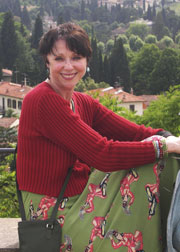 & Book Giveaway Comments Contest! & Book Giveaway Comments Contest!
Stephanie Riseley is a writer, teacher, and hypnotherapist. Her book, Love From Both Sides: A True Story of Soul Survival and Sacred Sexuality, tells the story of her husband dying in her arms and coming back to chat. Besides being a writer, Stephanie has studied hypnosis since 1971. Over the years, she's helped hundreds of people lose weight, quit smoking, and make empowering lifestyle changes. Because she's also a teacher, she explains how our computer-like brains work and then teaches her clients a skill-set that helps them to re-program their own brains. It's like fixing a glitch in the wiring, or like ridding a computer of a pesky internet virus. Scientific research proves that once people change their thinking, they actually change the physical structure of their brains. Because of that, they're freed of self-destructive behaviors that ruin lives and steal happiness. To do this, Stephanie uses hypnosis, along with techniques from Cognitive Behavorial Modification and Guided Interactive Therapy. Find out more about Stephanie by visiting her website: www.stephanieriseley.com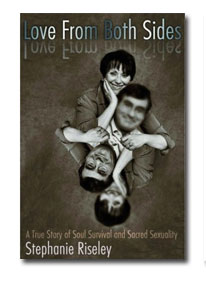 Love From Both Sides: A True Story of Soul Survival and Sacred Sexuality Love From Both Sides: A True Story of Soul Survival and Sacred Sexuality
By Stephanie Riseley
Paperback: 256 pages
ISBN: 1844091392
Publisher: Findhorn Press
In this memoir, memorial, and celebration, Stephanie Riseley shares the deeply emotional and powerfully physical story of the continued relationship between her and her husband Dan after his sudden death. Exploring the ways in which love and forgiveness can transcend the boundaries of life and death, the book intends to change perceptions of the emotional and spiritual relationships two people can share. Problematic marriages and challenging relationships will take on positive new dimensions. Book Giveaway Comments Contest!If you received our Events Newsletter, remember, we are holding a contest to win a copy of Stephanie's book, Love From Both Sides: A True Story of Soul Survival and Sacred Sexuality, to those that comment. So, grab a cup of coffee, pull up a chair, and enjoy the chat, and share your thoughts, and comments, at the end. We will randomly choose a winner from those who comment. Enjoy!
Interview by LuAnn Schindler
WOW: Stephanie, congratulations on your book publication. Thank you for launching your blog tour with WOW! Our readers will definitely want to get to know you, so let's get the tour started.
I lost my spouse six years ago, and for close to a year after his death, I heard him speak to me. And then one day, the discussions ended. Do you think that's a common occurrence when a loved one passes or do you believe only certain people have that cosmic connection?
Stephanie: I think everyone's experience with the "In Between" is specific and different, because it's all very complicated. People "hear" from the Other Side when they are able to "listen," i.e., go deep and quiet. For me personally, the pain of losing my husband was so searing, that I barely had access to my own thoughts, let alone the extra energy needed to "hear" from him. It wasn't until my own "circuits" calmed down enough and my own energy shifted away from the "pain/loss" and I actually got more centered, that my dear dead husband was able to break through the heavy energy that is mourning and begin to chat. I've had so many widows share similar experiences so I know I'm not alone. With your own year of husband chatting? That's about the length of time I had, as well. And in my book, that was because my husband's "energy" had healed enough to choose his next life, and so he reincarnated, and moved onto his next life, and next adventure. Maybe that was your husband's situation, as well.
Do only certain people have a cosmic connection? No, we are all wired to "hear." It's just a skill set that either gets developed or doesn't. Like playing a violin--you first need to pick up the violin, then you must practice. And that's all it takes. A desire followed by discipline. But as a species, we are all hard-wired to "hear."
WOW: It's interesting how some people tune in and others never experience 'hearing'. People may be surprised by what they discover.
Growing up, you experienced several serious medical setbacks, and eventually, you were diagnosed with lupus. How did that experience guide your career and writing choices?
Stephanie: The story of my own health "issue" would take another book, but in short? It's been my biggest gift. Yes, at 20 years old, I was diagnosed with Systemic Lupus--a pretty nasty autoimmune disease, where my body made anti-bodies to itself, that is, attacked all my own connective tissues. At the time, my doctors gave me about five years to live. Even though I could barely walk because of joint pain, couldn't breathe because my lungs were filled with fluid, and my kidneys were shutting down, I refused to believe those doctors, and I found an alternate form of healing. Because of that, today's my 62nd birthday, and I look and feel great! But I take very good care of myself. And that's what I teach my clients--how to take care of their bodies and how to take care of their brains and minds. What you decide to put inside your head is just important (if not more so) as what you put inside your body!
WOW: Deciding what to put inside one's head is a lesson everyone should consider. Healthy choices offer so many possibilities, as you mention. Perhaps you will write a book about your Lupus diagnosis and share your journey to good health.
Let's talk about your publication path. You had experience as a screenwriter, but you discovered getting a script picked up differs from publishing a novel. First, you tried the traditional route. And then, fate intervened. Would you share your story, from when you finished the book through the publication process, and now, marketing your book?
Stephanie: I gave up, literally. "Let go, let God." I'm a screenwriter, so I knew getting a book published would not be easy, but it was much harder than I imagined. I wrote to book agents, sent my book proposal out to publishing houses, I bought Arielle Ford's system, I signed up for some MediaBistro's "book selling" workshops, but nothing seemed to work. If you read my book, you'll see that finishing "Love from Both Sides" took all the energy I had, but I finished it, and thought, “Okay. Now what?” Since, I'm a hypnotherapist, and do Past Life Regressions, I created a website. Someone emailed me and asked me a question about Past Life Regressions, and I answered her. She kept asking more and more questions, until I said, "I wrote a book that will explain all of this. Why don't I send it to you?" And so I did. And she shot back immediately, "This is a fabulous book! Who's publishing it in England?" I said, "No one's publishing it in the U.S., let alone England." And she said, "Well, I forgot to tell you that I'm the book editor at the Birmingham Post, and I think Findhorn Press would love your book!" And with one email, I sent the book off to Findhorn Press, and the publisher, Thierry Bogliolo, said, "Not only do we want to publish it, but we want to fast track it."
If you think writing is hard? Selling impossible? Get ready for marketing. Unbelievably difficult, but doable!! If you keep smiling, yes? Know that it will feel overwhelming and impossible, but that you will do it anyway!
WOW: (Smiles) Isn't it amazing when luck connects you with a person and the end result offers a positive outcome? Your journey to publishing gives hope to those of us who are still searching for a publisher.
A book title is so important. Surveys show people purchase books based on titles and cover art. Love from Both Sides explains the importance of expressing love when you're alive and how love continues after death. Why is love important from both sides of life?
Stephanie: Before Dan, my husband died, I'd planned to write a book called, "The Married Girls Guide to Hot and Sacred Sex," but then he died, and because I needed to figure out a way of making money, I decided to go back and try to write that book. So, I got a group of married friends together to talk about marriage, sex (or the lack of it) and love. I'd been a widow for only four months by then, and I was still in "thick, miserably, mourning hell," but while they all complained about their very much alive husbands, I started to feel sick. Because I was surrounded by moms with kids, I left them to chat about marriage and sex, and I went home. It wasn't until the next morning, when I got up to yet another lonely, horrible Sunday that I got mad at being so miserable. (One of the stages of mourning.) And because of that, my energy shifted out of "mourning hell" (which is hard to break through for spirits) and my husband's energy burst into my body… into my arm, because I channeled him. The communication began with: You are my goddess now and forever. We walked a life together that allowed me to love more profoundly and deeply because of you. You must honor what we had together and forget the rest.
Love from Both Sides simply "presented" itself one day. The subtitle--A True Story of Soul Survival and Sacred Sexuality--I had to come up with for the marketing department. And that wasn't easy!
WOW: I'll be honest, the subtitle caught my attention! Do you write in other genres or do you specialize in spiritual non-fiction?
Stephanie: I'm a screenwriter, and I used to write short stories. I'm still proud of my wonderful, handwritten rejections from Roger Angel at the New Yorker!
WOW: You have a lot of varied writing experiences. Do you think it's important for writers to specialize?
Stephanie: Writers should write. Period. End of story. It's your purpose--it's your gift. Do it now, or you'll get to the Other Side, and there will be hell to pay! Head Spirits will be upset with you… your voice was needed.
WOW: (grins) I write every day so the head spirits should be pleased with me!
Stephanie, are you currently working on any projects you'd like to share with our readers?
Stephanie: Right now, I'm busy with my wonderful clients and the book marketing to do much else. But, just yesterday, one of my clients, a producer at Paramount, who's trying to launch a movie, asked me to read the script and give him notes. I said, "Why me?"
And he said, "I don't know anyone whose intelligence and judgment I’d trust more." Now, because all girls love to flattered, so even though I don't have time to do it, I said, "Yes." He's very crafty, my client, but my feeling is that the Universe works in such weirdo ways, and who knows where the next opportunity will come from. That’s why it's important say "Yes!" to everything. (Unless, of course, it’s dangerous or illegal! ;) )
WOW: Thanks, Stephanie, for giving readers a glimpse inside your book and your writing life. Best of luck on your blog tour.
Stephanie: My pleasure!
-----
Want to join Stephanie on her blog tour? Check out these dates and mark your calendar! You can also snag a copy of WOW's Events Calendar HERE.Blog Tour Dates: Come and join the fun!
MAY 18, 2009 Monday
Stephanie will be chatting with WOW ! Women On Writing at The Muffin. Stop by and share your comments! One lucky commenter will win copy of Stephanie's book! https://www.wow-womenonwriting.com/blog.htmlMAY 19, 2009 Tuesday
Stephanie will be stopping by Carolyn Howard-Johnson's blog, The New Book Review, to share some wonderful feedback from one of her readers. https://thenewbookreview.blogspot.com/MAY 20, 2009 Wednesday
Stephanie will be stopping by Ashley Cooper's blog, Rituals for Healthy Living, to discuss the differences between soul love vs. sexual love in everyday life. This should be an interesting post! https://healthylivingrituals.blogspot.com/MAY 22, 2009 Friday
Stephanie will be stopping by SuperEnlightenMe, a blog about spirituality and self-help topics, to share her thoughts on spirituality. https://www.superenlightme.com/MAY 27, 2009 Wednesday
Stephanie will be stopping by Linda Sue Anderson's blog, Holistic Future, to chat about one of the topics in her book--maintaining a relationship with a loved one after death. https://www.holisticfuture.com/JUNE 3, 2009 Wednesday
Stephanie stops by Mary Jo Campbell's blog, Writers Inspired, for an author interview & book giveaway comments contest! Be sure to stop by--Mary Jo's interviews are always a lot of fun! https://writerinspired.wordpress.com/JUNE 8, 2009 Monday
Stephanie stops by Your Hypnotist Blog to answer questions from the UK blog's readers! If you have a question for Stephanie, check out this post for details on how to send in your question. You can remain anonymous, but be sure you send in your question before Friday, May 22nd, for inclusion in this stop. It'll be interesting to see what questions readers will come up with! https://www.yourhypnotistblog.co.uk/JUNE 9, 2009 Tuesday
Don't miss this stop! Today, Stephanie stops by Hot Flashbacks Cool Insights to share one of the most unique flashes of intuition of all time--how to continue to commune with a loved one after death. https://hotflashbackscoolinsights.blogspot.com/JUNE 12, 2009 Friday
Stephanie stops by Madeline Sharples blog, Choices, to chat about memoir writing--specifically, writing to heal and the road to finding representation and a publisher for your memoirs. This should be an insightful stop for writers! https://madeline40.blogspot.com/JUNE 14, 2009 Sunday
Wondering if you've already met your life partner? Stephanie stops by Fiftyish Diva to share her tips on recognizing your soulmate. Not to miss! https://blog.fiftyishdiva.com/JUNE 16, 2009 Tuesday
Stephanie stops by Michele Avanti's blog, Astrology and More, for an author interview! This blog not only answers questions about all things metaphysical, it also shares information about publishing, writing, and creating successful books even for small niche publishers. https://www.astrologyandmore.blogspot.com/We also have several more dates to come, so be sure to check out our Events Calendar HERE.Get involved! We hope you are as excited about the tour as we are! Mark your calendar, save these dates, and join us for this truly unique and fascinating author blog tour. If you have a blog or website and would like to participate in Stephanie Riseley's blog tour, or schedule a tour of your own, please email Angela and Jodi at: blogtour@wow-womenonwriting.com ** Please feel free to copy any portion of this post. Oh, be sure to comment on this post to enter in a drawing for a copy of Stephanie's book Love From Both Sides: A True Story of Soul Survival and Sacred Sexuality.
Labels: author blog tour, author interview, Love from Both Sides, LuAnn Schindler, Memoir writing, Stephanie Riseley, True Story of Soul Survival and Sacred Sexuality
Your Life, in Six Words
Talk about boiling things down to their essence. I recently learned of an interesting book called Not Quite What I Was Planning: Six-Word Memoirs by Writers Famous & Obscure. Complied by the editors of online magazine SMITH, it contains over 1,000 six-word memoirs, including additions from many celebrities including Stephen Colbert, Jane Goodall, Dave Eggers, and more. A few examples from the famous, particularly some that might appeal to writers: "Couldn't cope so I wrote songs" Aimee Mann "Revenge is living well, without you" Joyce Carol Oates "I asked. They answered. I wrote." Sebastian Junger The entries from the "obscure," a.k.a regular people, are equally good. Here's a sampling--some funny, some touching: "70 years, few tears, hairy ears" "Naively expected logical world. Acted foolishly". "Never really finished anything, except cake" "Joined army. Came out. Got booted.” "Extremely responsible, secretly longed for spontaneity." "Cursed with cancer. Blessed by friends" (from a nine year old) "No wife. No kids. No problems" “I like big butts, can’t lie”. Can you tell your story in six words? SMITH is collecting submissions for their next six-word memoir book. It may be fun to give it a try. --MP Labels: books, Marcia Peterson, Memoir writing, submissions
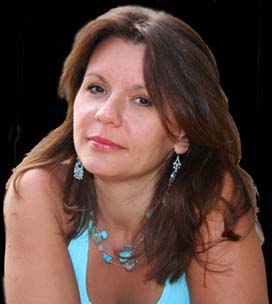 Carol D. O’Dell’s latest memoir, Mothering Mother, deals with a timely topic that we as women and mothers have to consider. ** How do age-related changes affect our parents?
** What should we do if a parent goes through Alzheimer’s? And how can we tell?
** What do we do if our parents can no longer take care of themselves?
** I know all of you have thought of this at one point or another, I know I have. But how do you handle it?
Carol’s book, Mothering Mother, shares her true-life experiences—funny, sad, hopeful—and how she made these decisions. She’s an amazing woman, an expert writer, and uncovers this heart-touching topic with grace. WOW: Welcome to the WOW! Blog, Carol. We’re excited to be able to chat with you today! So tell us, how did you get started in writing?Carol: How far back do you want me to go? I got the bug in elementary school. Remember the old spelling words? I used to take all twenty and weave them into a crazy story. The teacher would read them all, and everyone would laugh—and I was hooked. WOW: Oh how funny! I just talked about that in an interview I did with Chynna Laird on AC... about elementary school and the big lines on paper. Well, we’ve both come a long way... especially you Carol!
Congratulations on your latest memoir, Mothering Mother. We’ve heard great things about it. In fact, one of our contributing editors had already purchased your book right when it came out. Please tell our readers a little bit about the book and why you decided to share your story.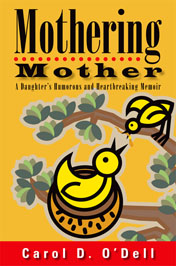 Carol: Carol: I was a 39 year-old wife and mother. I had started and was directing a private school (and writing short stories, essays and articles on the side) when I realized my mother could no longer live alone. I made that big leap and brought my mother into our home. At that time, we all moved from Georgia to Florida and found a house we could build a mother-in-law suite onto our house. I put the ole’ novel I was working on in the back of the drawer and dove head first into caregiving. But I didn’t want to give up writing. My soul ached for something beyond the typical medical based literature I was finding. I yearned for something for my soul, intellect and creativity. Most days, I felt as if I were the 89 year-old. I wanted something that addressed our relationship—as mother and daughter—and my relationship with my daughters and my husband—and how caregiving was impacting not only my life, but my perceptions. I couldn’t find anything that encompassed these deeper, more intimate issues. So, I began to write—every day. I wrote my fantasies, fears, and frustrations. I wrote about the terrible things you think you can’t say out loud. I wrote how scared and isolated I felt—so that hopefully, no one else would have to feel that alone. WOW: Carol, you definitely accomplished that with Mothering Mother, and helped readers relate. And for family members who’ve experienced a loved one going through Alzheimer’s, it causes so much agony. Do you remember the first signs or symptoms in your mother’s life?Carol: Looking back, I see a lot of signs I either missed or ignored. We all know that as we age, a certain amount of forgetting, senility is normal. But when is it no longer normal? I also realized as time went on, that my mother was making excuses, fibbing, if you will—covering things up. Alzheimer’s had been creeping up on us for years. I can look back and see the series of fender benders were probably related—when she let it slip out that she was at an intersection near her house and couldn’t remember how to get home. I now see that paranoia was an early sign. Mother always thought someone was breaking in, that people were stealing from her—all those little idiosyncrasies probably had something to do with Alzheimer’s. But I was busy. I wanted to believe my mother was all right. I wanted her to be independent—for me—and for her. I didn’t want to face what Alzheimer’s would do to all of our lives.
"I was there when everyone else went home.
That’s the day you grow up."
WOW: I can totally understand that, and it’s hard to actually know when the transition occurs. There’s no exact science to the subject, it all comes down to feelings and decisions... And one decision you had to make is whether or not to give your mother a feeding tube. That must’ve been extremely tough.
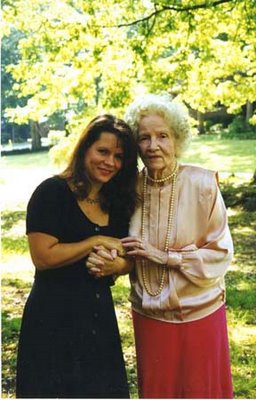 Carol: Carol: My mother did sign a living will, and because she had experienced some of the more “unpleasant” decisions when my father passed away, she was able to decide a few things about her own life. She hated seeing my dad on a ventilator. She saw him struggle with it, fight against it, and in her own way, she thought of all tubes as being like that one—intrusive. I also knew that at the age of 92, with Parkinson’s and Alzheimer’s, and a heart condition that my mother could not come back to any real quality of life. Alzheimer’s is irreversible. Mother had declined to the point of not knowing me—or anyone else. She had forgotten how to swallow or chew food. It was time to let go. It was harder to live out the decision to not use a feeding tube. I had Hospice there, and they assured me it was not cruel, that it was natural. I could tell that my mother was not in pain. I was there every day—every minute, and even in the middle of the night. I made sure she was serene and comfortable. Those last few weeks were rough. I had made a decision and I had to live by it. I was responsible. I was there when everyone else went home. That’s the day you grow up. WOW: Carol, I admire you so much. What heavy decisions to have to make... and I know you did the best thing. Considering your mother’s battle with Parkinson’s disease—do you have strong views on stem-cell research?
Carol: I do, but I also know that my mother had perhaps different views than I had. Stem cell research is inevitable, and we’re finding more options, more alternatives than before. We’re going to have to learn how to use it ethically and responsibly. I believe we need to talk, and argue, and grapple, and work through these issues. I understand and respect the moral implications that add to the complexity of this issue, and I think it’s important that we do speak to one another with kindness and respect for differing viewpoints, but in the end, I see stem cell research and applications as being “here to stay.” There’s so much good to be gained, and I do believe that scientists can find many solutions, alternatives and possibilities regarding stem cell research. WOW: Oh, I fully agree! I know that there are moral issues, but in my humble opinion, the benefits are great. Another tough decision you had to face was choosing in-home care. But how do you feel about care centers for the elderly? Not everyone can afford in-home care, as you know.Carol: I am honored to speak to many people across the country online and in seminars and support groups who are grappling with elder care needs. There is no one perfect solution and caregivers need to realize they will most likely be a caregiver more than once in their lifetime—and that their needs (as a family and the care receiver) change over time. For example, your loved one wants to live independently, and they do—for a time. Then you hire live-in help, and that works for a while, and then something happens. Do you bring them into your home? Can you afford to be there a good part of the time, or do you need to work? Is adult day-care available in your community? Things change again, your loved one may have been hospitalized, or their medical condition may have worsened. Again, you have to make yet another decision. Is assisted living right? Does your loved one need skilled nursing care of a memory care unit? Things keep changing. You think you have it all figured out. You work months to come up with a good living arrangement, and BAM. Back to square one. I tell you this not to discourage you, but to help you plan and prepare. Know your options now. Look into all the alternatives now. Start by looking close to home—yours or theirs. Find out what your own community has to offer. Your loved one needs to be nearby. They need an advocate, a family member who can look out for them. No matter how much they fight you, someone needs to be nearby.
"Memoir writing is not an autobiography.
A memoir means literally, a memory."
WOW: That’s excellent advice, and something we’ll all have to think about sooner or later. You must have grown a lot spiritually by writing this book. Has your experience with your own mother affected or changed your views for your future?Carol: Yes. Caregiving transforms you, and I believe it makes you a better person. You can’t “stare death in the eye” and not come out a changed person. My views for the future…living this experience with my mother has taught me a few things: - Forgive. Forgive now and let go. If not, it festers, and it’s really ugly.
- Examine and then let go of every fear you can possibly get rid of.
- Be flexible. Don’t demand things of others. Invest in those you love—invest your time, your money, your encouragement, your commitment to their lives, and do so willingly with no strings attached.
- Trust—trust that you’ll be loved and cared for. Have a good attitude no matter where you end up. Choose to be happy.
- Be grateful. Every day, for little things. Today, I was grateful for my cup of coffee (I’m always grateful for that), for the sand between my toes, for my beach walk and prayers, for my puppy dogs, and that first kiss from my husband when he returned from work. Gratitude works.
"Art is more about what you choose to leave out
than what you include."
WOW: I totally hear you, sister. That’s great advice! And that’s what I love about writing... it helps us gain perspective. So how did writing a memoir compare to the other styles of writing you’ve done?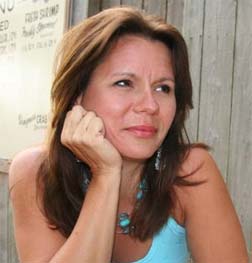 Carol: Carol: Memoir writing is not an autobiography. A memoir means literally, a memory. An easy way to think of it is that you take a memory—a thought—an idea, and you put it in a bubble in the center of your page. Then, you begin to look at your life and only write in that bubble memories, thoughts, events, reflections that have to do with that “topic” you placed in the center. For example, my book was about becoming my mother’s mother. So, each vignette is how that decision to be responsible, to allow caregiving to impact my life and those around me, how I perceived myself, my faith, my actions as it pertained to my mother and me—and our changing roles. If it doesn’t connect in some real way to that thought in the bubble, it doesn’t go—in the memoir you’re working on. Art is more about what you choose to leave out than what you include. WOW: I love what you just said, and am writing that down... what a great quote! You have a great deal of wisdom on writing, and we have readers who are currently trying to get their memoirs published. What advice do you have for them in terms of how to seek out an agent/publisher?Carol: First, tell your truths. Dare to be real on the page. Not vulgar. Not shocking, but real. Your story has to have an idea or concept that others can relate to. The personal is universal. You don’t have to be a celebrity or cut off your own hand to write a memoir, but it has to be real, and it has to be something others can relate to. My advice is to build your literary ladder as I call it when I speak to writer’s groups. Write articles, essays, contribute to anthologies, write for your town newspaper. Build your publishing credits. You have to have some sort of a track record. Write, blog, submit, submit, submit. Get used to rejections, and keep submitting. This could take years by the way, so keep your day job—for now. WOW: Speaking of taking years, oftentimes a memoir can be a hard sale; do you have any ‘insider tips’ on how to pitch a memoir?Carol: Sell excerpts to magazines. You prove it’s sellable. An agent gave me that advice, and I think it helped. I had sold six excerpts before the book came out. WOW: You seem to be very hands-on in terms of promotion and marketing. From your experience, what is the best way for authors to get their books into as many hands as possible?Carol: The Internet plays a big part now, so blog, join forums, submit e-zine articles. Write for free, (in the beginning) but keep a list of your publishing credits. Networking is vital to a writer. I do a lot of caregiving/Alzheimer’s, Parkinson’s, and Baby Boomer talks. I still believe you sell one book at a time. I like to and need to meet my readers. Go where they are. Don’t expect them to come to a bookstore. Whatever your subject is, there’s probably a hobby or organization for it—join in, get to know people, and let them know about you. WOW: Excellent. So, any future writing ventures in the works?Carol: The prequel to Mothering Mother is under consideration at my publisher’s now. It’s working title is Said Child, and it’s about being adopted at age four—and eventually finding my birth family—and loving and accepting both. WOW: Carol, you have a lot of story in you. I anxiously await your next book! Do you have any closing tips for our eager authors-in-waiting?Carol: Persistence, I know you’ve heard it before, but it’s true. So many people never turn a dream into a goal. You have to put legs on your dreams. Writing and publishing aren’t quick ventures. Relax, and enjoy the journey—and never give up. WOW: Thank you Carol for a wonderful and enlightening interview! You have a great spirit and vision, and are a remarkable woman. Thank you for chatting with us today—I’ve learned a lot!Mothering Mother is published by Kunati and available on Amazon and in most bookstores. Check out Carol's website at www.mothering-mother.com to view her touring schedule, Virtual Book Tour, contest, and radio and television appearances. Carol D. O'Dell is available for conferences, seminars, and interviews. Her topics include inspiration, spirituality, medical based talks, caregiving, and women’s issues. Her brochure is also available on her site. You heard it ladies! This is a must read and an opportunity of a lifetime! Carol has a wonderful contest on her site featuring all kinds of goodies. And when you think about gifts this holiday season, remember Mothering Mother for the perfect gift, and a caring gift... the gift of words, kindness, and love for your mom, and an enriching gift for your family. Labels: Alzheimer’s, caregiving, Carol O'Dell, how to write a memoir, kunati, Memoir writing, Mothering Mother, Parkinson’s, pitching a memoir, stem cell research, women writers
|
 & Book Giveaway Comments Contest!
& Book Giveaway Comments Contest! Get involved!
Get involved!

